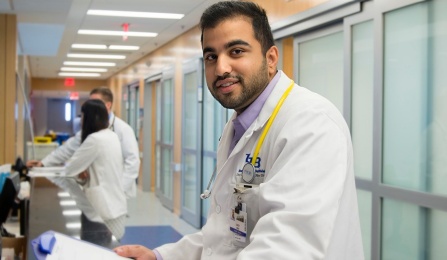Third Year Clerkship

During our clerkship, you’ll undertake case-based discussions and didactic sessions, and you’ll care for inpatients and outpatients. You’ll also have the unique opportunity to provide continuity of care to a standardized patient. Plus, if rural medicine interests you, you can gain experience treating medically underserved patients.
During small-group discussions, our faculty cover the workup of common acute and chronic conditions in the primary care setting.
Our didactic lectures cover:
- behavioral medicine
- addiction
- preventive screening
- patient safety
- global health
- pediatrics in family medicine
- primary care gynecology
- dermatology in primary care
- medical ethics
- prenatal care
- the patient-centered medical home
During your clinical preceptorship, you’ll work with outpatient faculty and community preceptors for a month, and on the family medicine inpatient service at one of our affiliated hospitals for two weeks.
You’ll also train in the Behling Human Simulation Center for a workshop each module in ambulatory procedures, including:
- joint injections
- skin biopsy
- gynecological procedures
- circumcision
- colonoscopy
Longitudinal Clinical Experience
Our unique longitudinal clinical exercise gives you hands-on experience providing continuity of care, a skill that most medical trainees don’t learn until residency.
Working at both the Behling Human Simulation Center and the Clinical Competency Center, you’ll care for the same standardized patient for four weekly sessions that simulate six months of care.
As your patient’s case evolves, you’ll:
- manage chronic disease
- learn about acute care, hospital care and follow-up
- use electronic health records
- give preventive screening tests
- educate your patient about lifestyle interventions
FMD 700 Family Medicine Clerkship
The goals of this course are to teach medical students the basic knowledge, skills and attitudes involved in the discipline of family medicine, primarily in the diagnosis and management of common undifferentiated problems of patients of all ages in the ambulatory setting and to promote independent learning, critical thinking and problem-solving skills.
The course consists of two components: a clinical preceptorship and small-group teaching sessions. Students will have the opportunity to see family medicine patients in various urban, suburban and rural inpatient and outpatient settings, including home visits, nursing home visits, night call and the coordination of patient care with community social agencies.
The tutorial component consists of problem-based learning and independent study.
At an orientation on the first day of the clerkship, each student will receive a detailed syllabus describing clerkship objectives, responsibilities, course curriculum and student evaluation.
Prerequisite: MS3 (this is a required third-year clerkship)
Option to Train in Rural Medicine
If rural medicine interests you, one of the benefits of our clerkship is that you’ll have the option to request a clinical placement in a rural community.
You’ll work with medically underserved patient populations and have the chance to learn about treating conditions that, in urban areas, might be referred to specialists. You’ll train alongside faculty mentors who have decades of valuable experience facing the unique challenges of caring for patients in rural areas.
Placement at a rural site during our clerkship is an immersive experience. You’ll have the opportunity to live in the community, as housing may be available at some sites. Some medical students have gained experience at hospitals including Westfield Memorial Hospital, UPMC Chautauqua and Wyoming County Community Health System.
Others have been placed at family physician offices in:
- city of Jamestown
- towns of Ripley and Westfield
- villages of Corfu, Gowanda, Mayville and Perry
Preview before committing
To help you decide whether you want to dedicate your family medicine clerkship to rural medicine, you’ll have the opportunity to visit a rural community in your first and second years of medical school.
Each year, the Family Medicine Interest Group plans a trip to a rural community, making it possible for you to:
- tour and meet potential mentors at a rural hospital
- explore the community
- visit a community physician’s office
- speak with like-minded students and faculty about your interest in rural medicine